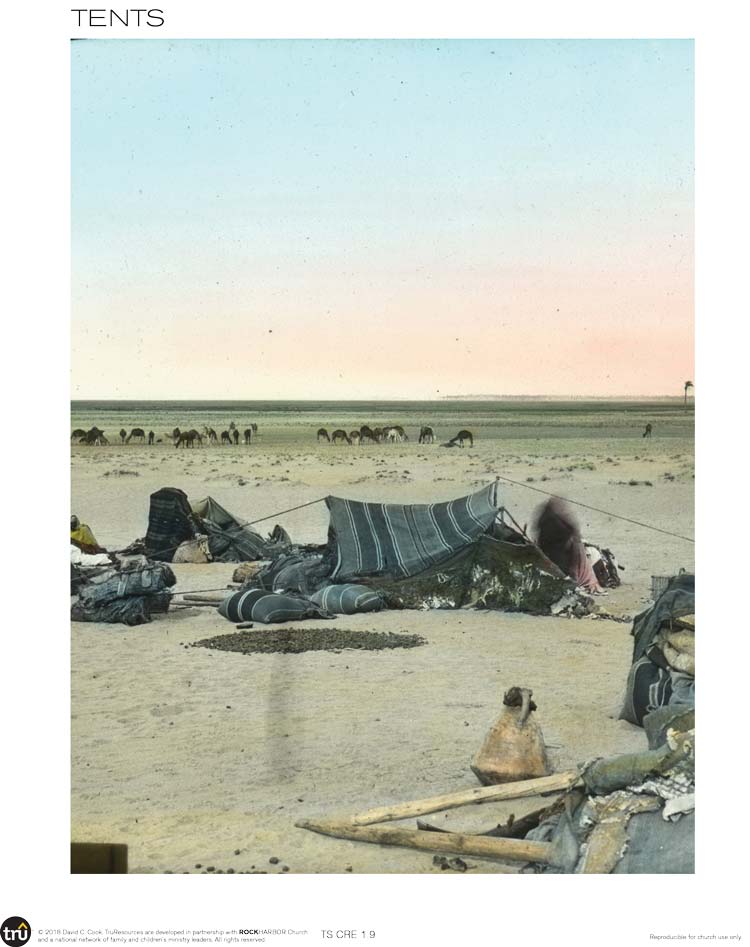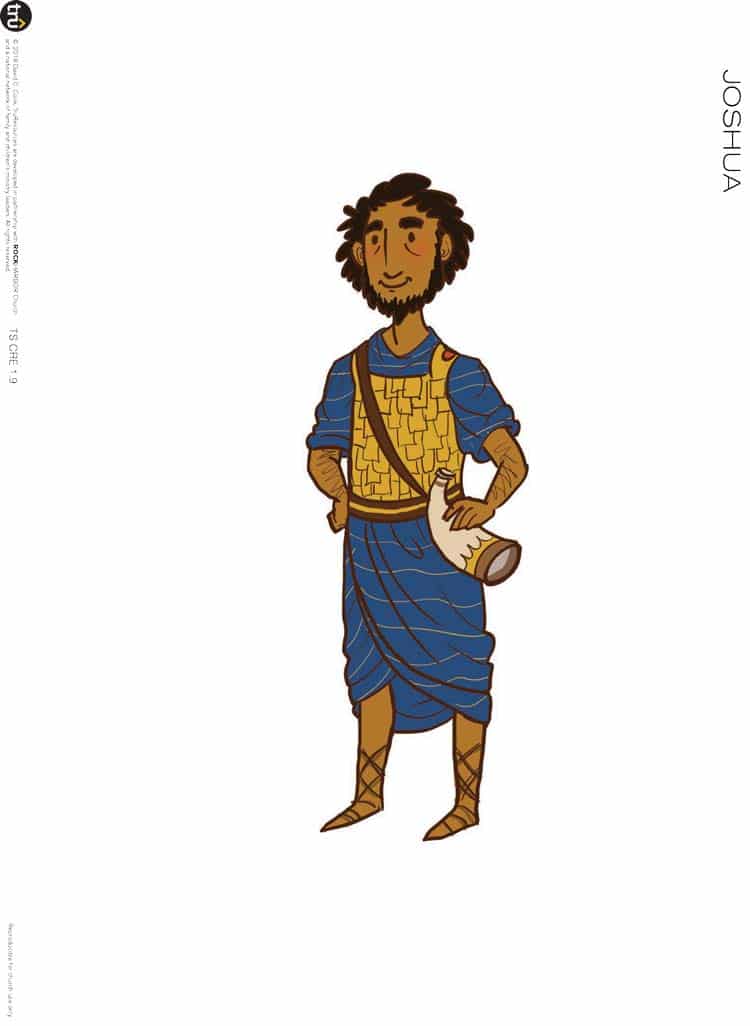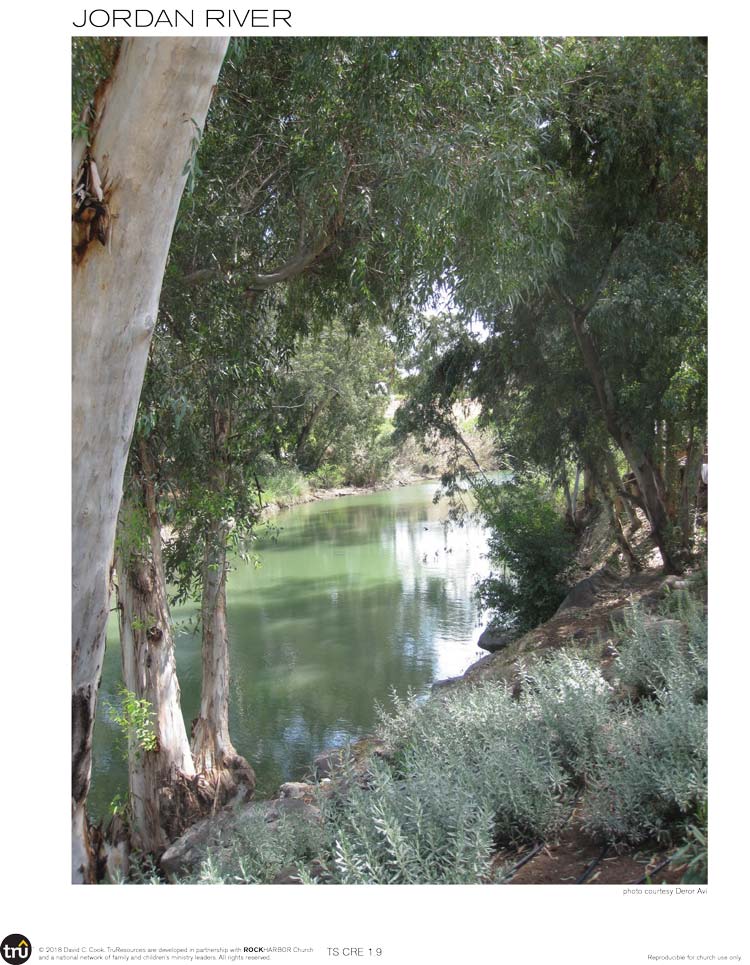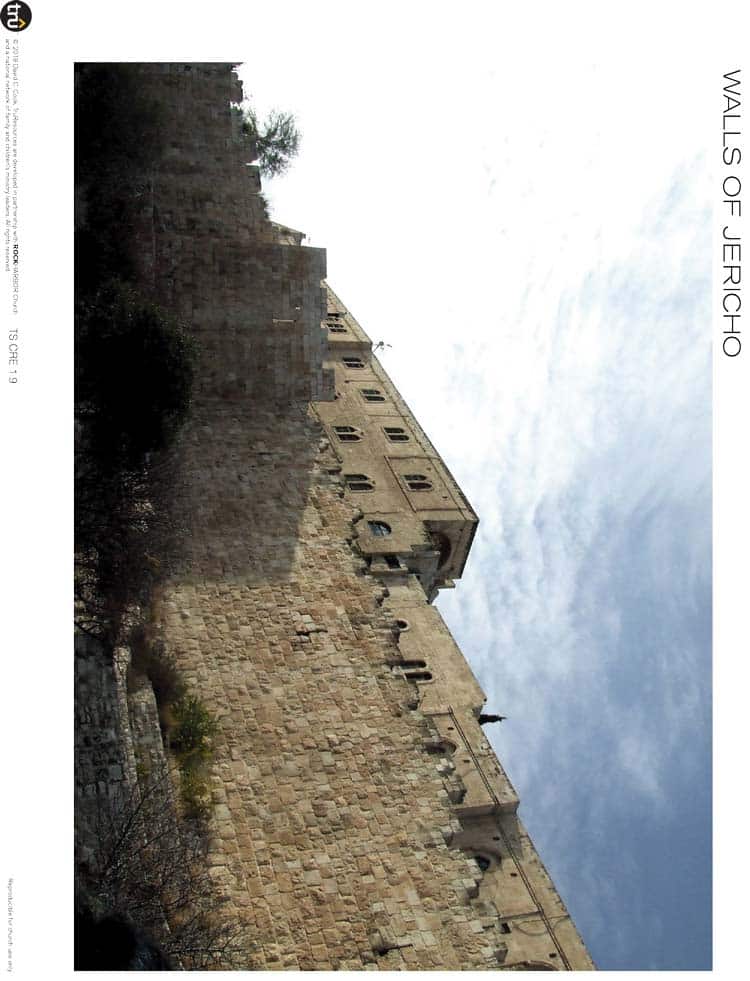Use this lesson to teach elementary students about God’s faithfulness through the story about the Walls of Jericho.
Editor’s Note: This lesson was adapted from Tru Story, 3rd-4th Grade.
Bible Passage: Joshua 1—6
Focus: God is Faithful
Memory Verse: Jeremiah 9:24
Materials:
- Knock-Down Questions: Knock-Down Questions strips; 12 Boxes (small) or bottles (2-L., empty); Scissors; Tape; Paper (at least 1 sheet per child)
- Storytelling: Storytelling Images Group 1, Storytelling Images Group 2, Storytelling Images Group 3, Storytelling Images Group 4; Bibles; Tape; Sticky notes (3 per child); Pens or pencils
- Respond: Stones (1 per child, smooth, medium); Tempera paints (various colors); Paintbrushes (1 per child); Optional: smocks or old shirts

Walls of Jericho Bible Background
God is faithful. He proves this to His children again and again. Still, the first generation that left Egypt during the exodus had a hard time trusting God.
They knew the promise God gave to their forefathers—to take them to a land flowing with milk and honey, where they could live as a nation set apart for Him (Exodus 33:1–3).
They also agreed to the covenant at Mount Sinai, during which God gave His people the Ten Commandments and called them His treasured possession.
The Israelites saw God’s faithfulness when He rescued them from slavery in Egypt. They experienced His provision when He gave them food in the wilderness.
Yet they continued to grumble and complain because they didn’t truly trust Him. And though their spies discovered that the Promised Land was, indeed, a good land, the people weren’t excited, for they also heard the cities were full of powerful men (Numbers 13:26–29).
Their fear blinded their trust that God would be faithful to His promise. Because of this, God said that no one in the first generation would enter the land (Deuteronomy 1:35–36).
Their fear blinded their trust that God would be faithful to His promise.
The next generation, though they also would grumble and complain, spent their entire lives depending on God to provide for their every need. When God asked them to do unconventional things, they followed His lead.
Because God was with them, the second generation crossed a flooded river, marched around the fortified city of Jericho, and overtook it. The second generation saw the land God had promised.
God kept the promise He made to bring His people into a good land, and He proved to His people that He was—and is—always faithful.
He only asked that they trust Him and follow His lead so He could transform them into faithful people who served Him with their whole hearts.
Opening Activity: Knock-Down Questions
Children will knock down boxes or bottles to discover questions to answer.
Materials:

- Knock-Down Questions strips
- 12 Boxes (small) or bottles (2-L., empty)
- Scissors
- Tape
- Paper (at least 1 sheet per child)
Print and cut apart the Knock-Down Questions strips. Tape one question to each box or bottle. You may choose to add more questions of your own.
Set up by standing up the boxes and bottles in a line to create a “wall.”
Open your time by asking this question: When was a time you saw a group of people marching? (Examples: parade, halftime show at high school or college football game, etc.)
Have children crumple sheets of paper into balls. One at a time, allow them to throw the paper balls at the wall to try to knock down parts of it. Whatever bottle or box a child knocks down will be the question he’ll ask the group.
After the kids answer the question, have the next child take a turn at throwing a ball at the wall. Let the kids keep playing until the entire wall has fallen.
Storytelling
Bible Passage: Joshua 1—6
Materials:
- Storytelling Images Group 1, Storytelling Images Group 2, Storytelling Images Group 3, Storytelling Images Group 4
- Bibles
- Tape
- Sticky notes (3 per child)
- Pens or pencils
Prepare Ahead
Print the Storytelling images listed in materials above (4 groups of images, 12 total images).
Tape the images at the kids’ eye level around the room. Keep the images within each group together. Give each child three sticky notes. Have the kids write their name on their sticky notes.
Teacher Script
Gather the kids in a circle. Lead the children in a Prayer of Release to pause, be still, and ask the Holy Spirit to quiet their hearts and minds.
(The Prayer of Release allows children and leaders to pause, be still, and ask God to quiet their hearts and minds. Before you pray, you might ask the kids to hold out their hands, palms up, in a spirit of releasing their worries and distractions in order to better receive what the Holy Spirit might have for them today. Then encourage the kids to quiet their voices, take a seat, and pray with you.)
Explain that today’s part of The Big God Story will be told a little differently—from the fictional account of a girl named Bekah who may have lived during the time when the Israelites wandered in the wilderness.
Though the story in the Bible is real, this narrative is written as a creative storytelling technique to help kids connect to the true story.
Before you explore this part of The Big God Story through this creative narrative, invite the kids to read through today’s part of The Big God Story found in Joshua 1:1–11; 3—4; 5:10–15; 6:1–20.
Feel free to read fewer verses. You might go around the circle and have each child read a few verses or designate a few readers to read certain passages.
Note: It’s best to tell this story in sections. After each diary entry, stop and engage with the kids in the ways suggested.
The Big God Story
Read each diary entry to your students.
Dear Diary,
My name is Rebekah—“Bekah” for short—and I want to tell you the story of how I got to the Promised Land. Since I was born, my family and I have been in the desert. You see, I’m an Israelite. About 40 years ago my grandparents and parents used to be slaves in Egypt. My dad was just a small boy then, but he still remembers how God saved him and his people from slavery through some amazing displays of His power!
My dad loves to tell me stories about God’s faithfulness—like how He parted the Red Sea, sent honey-flavored cracker bread called manna from heaven to feed His people, and gave us water from stones. But my favorite stories are about the Promised Land. My dad says it’s flowing with milk and honey. He says that one day God will fulfill His promise and lead us there. When He does, we will stop sleeping in tents and finally build a real house!
I ask my dad, “Why aren’t we there yet?”
Dad says, “God is waiting for a faithful generation.”
“What is that?” I ask. Sometimes my dad uses big words and he has to explain them to me.
“Well,” Dad says, “‘Faithful’ means God does what He says He will do. We can trust Him. And ‘generation’ means a group of people close in age.” He explains that my brothers and I are one generation, and he and my mom are another generation.
He also explains that the old generation, my grandparents’ generation, wasn’t faithful. They didn’t trust God to take care of them. They even disobeyed God by worshipping idols! So God decided that the old generation wouldn’t get to go to the Promised Land. Instead, they would have to live the rest of their lives in the desert.
Dad tells me how God is waiting for a generation of faithful people who trust Him with all their hearts and minds. He is waiting for a generation willing to be His servants. Then God will take us to the Promised Land. I hope that we’re the faithful generation God is looking for, ’cause I can’t wait to see the Promised Land!
Pause here.
Explain to the kids that one group of pictures in the room goes with this section of The Big God Story. Invite kids to choose the group that they think goes with this part of the story by placing a sticky note under this group.
After everyone “votes,” reveal the correct group (Group 1) and place the pictures at the front of the room in a single row.
Ask the children why they chose the pictures and how they think the pictures go with the section they just heard.
Dear Diary,
Yippee! The day I’ve been dreaming about is finally here! Today we’re going to the Promised Land. A few nights ago, Joshua, our leader since Moses died, sent spies into the Promised Land. The spies sneaked into Jericho, a big city protected by strong, thick stone walls. They just got back last night and told Joshua that while Jericho is a strong city, they know God wants to give us this land. So this morning Dad woke us up early to pack our things. Through Joshua, God is leading us into the Promised Land!
Pause here.
Repeat the previous process with the photos (the correct group is Group 2). After you have gathered the images, ask:
- What do you think it would be like to be a spy?
- Why do you think Jericho had walls around it?
Dear Diary,
Have I got something to tell you! Today we came to the huge, rushing Jordan River that was right in the way! And there were no boats or bridges to help us cross it! I cried to Dad, “Oh, no! How will we ever get to the Promised Land?”
Dad said, “Bekah, God is faithful. Trust Him. He will get us across.” Then I saw Joshua order the priests to walk into the river with the ark of the covenant on their shoulders. The ark of the covenant is very special. Inside are the tablets on which God wrote His Law. The ark of the covenant always goes before us because it’s the symbol of God’s presence with us.
At first I thought Joshua was out of his mind! I thought the river would sweep the priests away! But then I remembered what my dad said: God is faithful, and He is looking for faith from His people. So I decided to trust in God.
And then…it happened. A miracle! The river stopped flowing! I could hardly believe my eyes. As we crossed through the riverbed on dry land, my dad and I sang praises to God. Tonight we’re eating and sleeping in the Promised Land!
Pause here.
Repeat the process of choosing three more pictures (the correct group is Group 3). After you have gathered the three images, ask:
- Why is the ark of the covenant special?
- What do you think God’s people said when they saw the Jordan River?
- What would you have said if you’d been there?
Dear Diary,
You won’t believe what happened! Remember the city of Jericho? The one with the big, thick walls? Well, God told Joshua that He wanted us to march around the city for seven days with trumpets and the ark of the covenant. On the seventh day, we were to stop and shout while the priests played their trumpets. It sounded like an impossible plan to me. Then I remembered how God parted the Jordan River, and I decided that I wanted to be a part of a faithful generation. So I prayed, “God, I want to be a faithful servant. I will march around Jericho because I know that’s what You told us to do.”
When Joshua told us it was time, my dad and I marched. On the seventh day, I shouted at the top of my lungs with everyone else and…the walls of Jericho came crashing down! God did it! Dad says it’s official: God has given us the land. He was faithful to us and kept His promise! Now, Dad says, it’s up to us to ask God to help us be the type of people who serve God—who are faithful as He is faithful. You know what, Diary? God has been so faithful to me that I want to be a faithful servant willing to serve Him! In fact, I can’t wait to see how He uses me as His servant. I also can’t wait to see what He does next!
Place the remaining three pictures up front for the kids to see. Discuss each image and how it connects to this section of today’s part of The Big God Story.
SAY: Today we heard about another amazing part of The Big God Story—a time when God proved His faithfulness to His people by bringing them into the Promised Land. God brought this generation to the Promised Land because they had grown up in the desert and had learned to depend on Him for their every need. He brought them to the land because He’s faithful and desires for His people to be a faithful generation.
Share about a time God kept His promises to you.
Discussion Questions
- What does faithful mean?
- What did God do so the Israelites could get across the Jordan River? Joshua 3:14–17
- What did God do so the Israelites could get into Jericho? Joshua 6:2–5
- Do you think it took faith for the Israelites to march around the walls of Jericho? Why or why not?
- How did this part of The Big God Story show you that God is faithful? Joshua 3:16–17; 6:16, 20
- How has God shown Himself to be faithful to you?

This lesson is from Tru—a life-changing, spiritually-forming, parent-engaging, kid-captivating, downloadable curriculum designed for churches of all sizes and denominations. Check out this video for more!
Like what you see? Visit TruMinistry.com or our curriculum page for free lessons!
Remember Verse
The Remember Verse focuses on a character trait of God that’s highlighted in today’s portion of The Big God Story.
“Let the one who boasts boast about this: that they have the understanding to know me, that I am the Lord, who exercises kindness, justice and righteousness on earth, for in these I delight,” declares the Lord.
Jeremiah 9:24
Game: Verse Battle
Read through the Remember Verse a few times with the group. Once the kids are familiar with the verse, have two of them “battle it out” to see who knows it the best.
Have one child start the verse by saying the first word, then the second child continues the verse by saying the second word, and so on.
If a child misses a word, another child from the group will take his place and the “battle” will begin again. If you want, have the kids stand back-to-back.
Respond
Children reflect on what the Holy Spirit is teaching them and respond to God through creative activities and games.
Materials:
- Stones (1 per child, smooth, medium)
- Tempera paints (various colors)
- Paintbrushes (1 per child)
- Optional: smocks or old shirts
SAY: Our God is faithful. He always does what He says He will do. The Bible reminds us of this truth. Today, listen to these Scriptures and ask God to speak to you through His Word.
Invite the children to close their eyes as you read the following Scriptures aloud:
- Know therefore that the Lord your God is God; he is the faithful God, keeping his covenant of love to a thousand generations of those who love him and keep his commandments. Deuteronomy 7:9
- For the word of the Lord is right and true; he is faithful in all he does. Psalm 33:4
- Who is like you, Lord God Almighty? You, Lord, are mighty, and your faithfulness surrounds you. Psalm 89:8
- God is faithful, who has called you into fellowship with his Son, Jesus Christ our Lord. 1 Corinthians 1:9
After your kids hear the Scripture, ask:
- How does it make you feel to know that God is faithful to keep His promises?
- How has God been faithful in your life?
Invite the children to ponder these questions. Then, encourage your kids to worship God by also building a “memorial” using stones, similar to how the Israelites built a memorial after crossing the Jordan River.
Show your kids the stones, paints, and brushes. Encourage them to respond to God’s faithfulness in their lives by simply painting a stone.
They can paint an image that reminds them of God’s faithfulness (such as stick figures of their family members, food in their pantry, etc.) or paint a word.
Optional: Have them put on a smock or old T-shirt to help keep their clothes clean. Allow the children space and freedom to express their worship and response to God through art.
Bless
Children receive a blessing from their leaders and sometimes one another. A blessing can be a prayer of commission, a portion of Scripture, or words to encourage and guide.
Gather the children into a circle. Read Psalm 36:5: Your love, Lord, reaches to the heavens, your faithfulness to the skies.
Read Psalm 36:5 again. This time encourage your children to reach upward when you say “heavens” and “skies.”
Finally, bless the group with the following: May you know God loves you very much. May you see His faithfulness in your life.
Looking for more lessons from Tru Curriculum on Ministry Spark? See them all here.















